Alpen-Adria-Universität Klagenfurt
|
Alpen-Adria-Universität Klagenfurt | |
 | |
| Motto | Per Aspera Ad Astra (Latin) |
|---|---|
Motto in English | Through hardships to the stars |
| Type |
Flagship Public |
| Established | 1970 / 1975 / 1993 |
| Budget | € 62 million (annual federal funding) |
| Vice-Chancellor | Oliver Vitouch |
Academic staff | 1,029 |
| Students | 11,556[1] |
| 899 | |
| Location | Klagenfurt, Austria |
| Campus | Suburban, 27 acres (11 ha) |
| Colors | Shades of Blue |
| Website | www.aau.at |
| Data as of 2016 | |
The Alpen-Adria-Universität Klagenfurt (AAU), or University of Klagenfurt, is a federal Austrian university and the largest research and higher education institution in the Austrian province Carinthia. It has its central campus in Klagenfurt.
Founded in 1970, the university today holds faculties of Humanities & Social Sciences, Management & Economics, Technology, and Interdisciplinary Studies. It ranks among the 150 best "young" universities worldwide (under the age of 50 years) in the QS World University Rankings.[2]
The university has defined two areas of research excellence, Networked and Autonomous Systems and Social Ecology (until 2018, transferred to BOKU), with the latter spawning three ERC Grants. It is going to launch a new excellence initiative, Humans in the Digital Age (HDA), in 2019.
It also hosts a number of central facilities such as the Robert Musil Institute (co-organizer of the Bachmann Prize), the Karl Popper Kolleg (an Institute for Advanced Study), the University Cultural Centre (UNIKUM), the build! Gründerzentrum (a start-up facilitation centre), the University Sports Centre (USI), and the Klagenfurt University Library.
Oliver Vitouch, a cognitive psychologist and former faculty member of the University of Vienna and the Max Planck Institute for Human Development in Berlin, is the university's vice-chancellor. Larissa Krainer chairs the Academic Senate, Werner Wutscher is chairman of the University Council.
The University of Klagenfurt is situated 30 km from the Slovenian and 60 km from the Italian border and supports bi- and multilingualism, especially in the context of the Slovenian minority in Carinthia. Together with the Free University of Bozen-Bolzano (Italy) and the University of Fribourg (Switzerland), it is among the three southernmost universities in the German-speaking world.
History

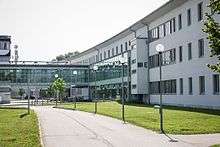
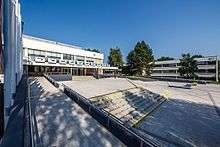
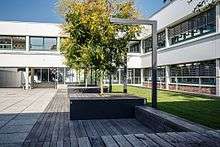
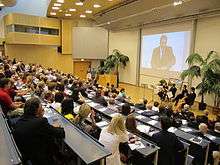
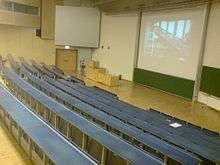

With the protestant collegium sapientiae et pietatis founded in 1552, Klagenfurt hosted one of the oldest gymnasiums in Austria (today's Europagymnasium), but had no ancient university tradition.
In 1970, the Austrian parliament passed a federal law allowing the establishment of an Educational Science College in Klagenfurt. The first doctoral degree was conferred in 1972. In 1975, new laws on higher education came into force, with the name of the college being changed into Universität für Bildungswissenschaften (University for Educational Sciences).
In 1993, the university’s name was changed again to Universität Klagenfurt, and at the same time, a Faculty of Humanities and a Faculty of Economics, Business Administration, and Informatics were inaugurated. The Faculty of Interdisciplinary Studies was inaugurated in 2004.
The university adopted the official cognomen Alpen-Adria-Universität Klagenfurt in 2004 (with its legal name still being Universität Klagenfurt). It was extended with a fourth, Technical Sciences faculty in 2007 (with a focus on Informatics, Information Technology, and Networked & Autonomous Systems), engaging in research operations in collaboration with the Lakeside Science & Technology Park. In 2012, the number of students passed the 10,000 mark.
Campus
With its suburban setting, the university campus is in walking distance of both the renaissance-dominated historic city center of Klagenfurt (capital of the state of Carinthia) and the east bay of the Wörthersee, a renowned Austrian summer resort. Also hiking, climbing and skiing possibilities in the Austrian Alps are nearby. Together with the adjacent Lakeside Science & Technology Park,[3] a 60 acres start-up and spin-off park, the university campus forms the so-called Lakeside District.
Faculties, Departments and University Centres
Faculty of Humanities
The Faculty of Humanities currently encompasses twelve departments and a faculty centre. Their common ambition, beyond doing discipline-specific research, is to foster multilingualism and intercultural education, with particular emphasis on the Alps-Adriatic region.
- Department of English and American Studies
- Department of Cultural Analysis
- Department of Educational Sciences and Research
- Department of German Studies
- Department of History
- Department of Media and Communications Science
- Department of Philosophy
- Department of Psychology
- Department of Romance Studies
- Department of Slavonic Studies
- Robert Musil Institute for Literary Studies
- Faculty Centre for Sign Language and Communication of the Hearing Impaired
Faculty of Management and Economics
The Faculty of Management and Economics has a focus on applied business management while fostering interdisciplinary links with law, sociology, economics and application-oriented geography. Within these disciplines, the Faculty concentrates on areas of research and development, teaching and consulting in fields where cultural, business and social factors interact.[4]
- Department of Business Management
- Department of Economics
- Department of Financial Management
- Department of Innovation Management and Entrepreneurship
- Department of Production, Energy, and Environmental Management
- Department of Public, Nonprofit, and Health Management
- Department of Sociology
- Department of Geography and Regional Studies
- Department of Law
Faculty of Technical Sciences
The Faculty of Technical Sciences is dedicated to research and training in the fields of informatics, information technology and technical mathematics. The Faculty was founded in January 2007 and superseded the Faculty of Economics, Business Administration and Informatics as well as a newly established Department for information and communication technology. The Faculty is headed by Dean Gerhard Friedrich (informatics) and Vice-Dean Clemens Heuberger (mathematics). It is organized into nine departments and offers four bachelor's degree programs, four master's degree programs, two teacher training degree programs and two doctoral programs.
- Department of Applied Informatics
- Department of Informatics Education
- Department of Informatics Systems
- Department of Information Technology
- Department of Mathematics
- Department of Mathematics Education
- Department of Networked and Embedded Systems
- Department of Smart Systems Technologies
- Department of Statistics
The special research area "self-organizing networked systems" closely collaborates with the research institute Lakeside Labs.[5]
Faculty of Interdisciplinary Studies
The Faculty of Interdisciplinary Studies develops, tests and evaluates innovative ideas in the academic fields of research, training and organization. The objective of the Faculty is to tackle prevailing social problem areas by creating adequate research and learning processes.
- Department of Instructional and School Development
- Department of Palliative Care and Organizational Ethics
- Department of Science and Technology Studies
- Department of Science Communication and Higher Education Research
University Centres
- Centre for Women's and Gender Studies
- Karl Popper Kolleg (Institute for Advanced Study)
- M/O/T – School of Management, Organizational Development and Technology
- School of Education (SoE)
- UNIKUM (University Cultural Centre)
Rankings
| University rankings | |
|---|---|
| Global | |
| QS World[6] | 701–750 |
From the STEM fields, the university has technology, engineering, and mathematics in her spectrum, but not any classic sciences or life sciences, which is a handicap in the large global university rankings. Still, in the QS World University Rankings, which aim to rank the 1,000 best universities in the world (out of > 26,000), it is listed in the 701–750 group, between the University of Graz (561–570) and the University of Salzburg (751–800).[7] Since QS extended its Top 50 Under 50 young university ranking to the best 150 universities worldwide under the age of 50 years for its 2018 league tables, Klagenfurt features also there, in the 101–150 group.[8] Since 2017, it is also listed in U-Multirank.
Honorary doctors
- Hans Albert (2007)
- Manfred Bockelmann (2013)
- Joseph Buttinger (1977)
- Karl Corino (2014)
- Peter Eichhorn (2003)
- Helmut Engelbrecht (1998)
- Hertha Firnberg (1980)
- Adolf Frisé (1982)
- Gerda Fröhlich (1995)
- Manfred Max Gehring (1992)
- Ernst von Glasersfeld (1997)
- Georg Gottlob (2016)
- Michael Guttenbrunner (1994)
- Maja Haderlap (2012)
- Peter Handke (2002)
- Adolf Holl (2000)
- Johannes Huber (2017)
- Sigmund Kripp (1998)
- Maria Lassnig (1999 / 2013) [9]
- Claudio Magris (1995)
- Ewald Nowotny (2008)
- Valentin Oman (1995)
- Paul Parin (1995)
- Wolfgang Petritsch (2013)
- Theodor Piffl-Perčević (1977)
- Janko Pleterski (2005)
- Wolfgang Puschnig (2004)
- Josef Rattner (2006)
- Siegfried J. Schmidt (2004)
- Klaus Tschira (1995)
- Peter Turrini (2010)
- Oswald Wiener (1995)
- Horst Wildemann (2003)
- Josef Winkler (2009)
References
- ↑ https://www.aau.at/universitaet/profil/fakten-zahlen-daten/
- ↑ QS Top 50 Under 50 2018, retrieved on January 22, 2018
- ↑ http://www.lakeside-scitec.com/en/
- ↑ http://www.uni-klu.ac.at/fwiwi_eng/inhalt/1.htm
- ↑ http://www.lakeside-labs.com/
- ↑ QS World University Rankings 2019
- ↑ QS World University Rankings 2019
- ↑ QS Top 50 Under 50 2018
- ↑ Awarded 1999, accepted 2013
External links
Coordinates: 46°36′59″N 14°15′54″E / 46.61639°N 14.26500°E